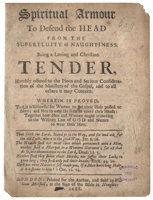What Did Thomas Wall Believe About Head Covering?

[Series introduction: This post is part of a series that examines what certain leaders in church history believed about head covering. Their arguments, choice of language and conclusions should not be misconstrued as an endorsement from us. The purpose of this series is to faithfully show what they believed about covering rather than only selectively quoting the parts we agree with.]

In 1688, Thomas Wall published a book entitled “Spiritual Armour To Defend the Head From the Superfluity of Naughtiness.” It was a passionate rebuke of men wearing their hair long (contrary to 1 Cor 11:14) and women cutting their hair short (contrary to 1 Cor 11:15). This was a widespread issue, which Wall says was “suffered in almost every Congregation that say they are the Churches of God.” He said that this “sin is so generally spread, that it is as a Leprosie”. He hoped that his book would help Christians take seriously what God’s word and nature teaches us about our hair.
The Apostle Paul’s reason for proper hair lengths is “grounded in God’s order in Nature” and was for people “in all ages”. To those who wore their hair contrary to this, Wall did not soften his words. He says they have “fallen into sin”, “worketh abomination”, are “unclean” and “not fit to touch the holy things in the Church of God”. Ignoring these hair distinctions were the “the inlet to other evils in the Churches of God”.

Wall’s rebuke also extended to the preachers of his day. These are the people who are charged to teach the whole counsel of God, to God’s people. Instead, “this evil” is “winkt at by the Ministers”. He saw two reasons for their unwillingness to call the church to repentance on this issue. The first reason was hypocrisy as they too “are chief trespassers in this evil thing” and if they spoke against it, would “openly condemn themselves”. The second reason they didn’t deal with this issue was their fear of man. If the ministers rebuked those who transgressed they’d “offend the rich among them” who are “generally most guilty”. Displeasing the rich meant they’d lose the “quarterly payments they receive from them” and it would “lessen their congregation”. Wall said that many pastors gloried “more in their number, than in taking care to see their flock walk as becometh the Gospel.”
As to what constitutes “long hair”, Wall defines it as “a covering to her eyes.” Men therefore were “to cut their hair short” so that they could not draw “it forward to cover their eyes”. They were also not to wear periwigs which he described as a “sinful shame”. He did not take issue with men wearing caps as “God’s ministers of old wore such in the service of God, yet broke not God’s order in nature [Exod. 28:40, Ezek 44:18].” So in 1 Cor 11:4 he didn’t see Paul requiring men to be bareheaded, rather they were not to wear a “woman’s vail”.
Women were to wear a head covering, in addition to keeping their hair long. He explains that before the fall of man, a woman’s hair was a “glory to her”. Wall says “so it is still”, but it has now taken on an additional and contrary attribute. By “reason of sin, and because she was the instrument to draw her Lord into sin with her, her glory therefore became her shame.” Since this is so, now “her hair must be decently bound up and cover’d”. So in the midst of a long treatise on hair lengths, we see that Wall believed the practice of head covering was to continue as well.
Wall was concerned that Christians in his day were ignoring what God had said “in his written word”. He knew that when Christians disobeyed God’s word they could incur His “sore displeasure”. He asked, “shall Christian’s account it a light thing, to live in the known breach of God’s Law [Deut. 22.5.]: yea not only this Law, but the Moral Law written in every Man’s heart; which teacheth Man that he shall not do any act or thing that is against Nature…”? Wall hoped that the “faithful” which “mourn to see this abomination” would call on their ministers to preach against this practice and that the ministers would hold the laity accountable. Those congregants who will not reform would be dealt with “according to God’s holy Order, as it is written, If thy brother sin, tell him of his fault; if he hear thee, thou hast gained thy brother; if he refuse, to take one or two and admonish him; if he hear not them, to tell it to the Church, that so the Church may admonish him: if he refuse to hear the Church, to cast him out [Matt. 18.15-17.]”
- The Head Covering Movement’s New Direction: A Call for Team Members - July 11, 2025
- Is Head Covering Related to Spiritual Gifts? A Response to Barry York - July 5, 2023
- A Husband’s Authority is Limited (He is Not Pastor or King) - November 14, 2022



